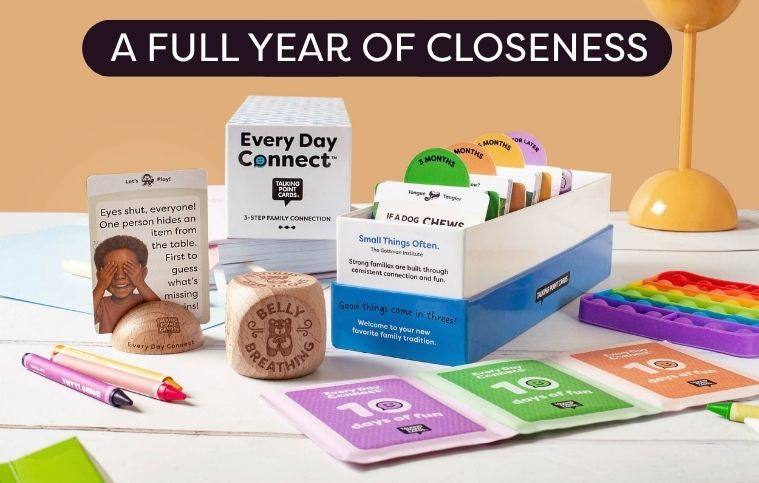SHOP
About
-
How do light-hearted questions help open up deeper conversations?
How can the Support Pack help kids become more comfortable sharing their thoughts and feelings?
Three tips for parents who want to create a safe communication environment for their kids
What types of questions should parents avoid when talking to a child who has experienced trauma?
Emily’s three Favorite Cards from the Support Pack and Why They’re Game Changers
Why These Three Matter
Shop
With a background in public health, trauma-informed coaching, and behaviour change, Emily Greenway helps people move beyond burnout and reconnect with themselves. Her work with children and adults impacted by trauma has shaped a deep understanding of the nervous system, emotional regulation, and the healing power of presence.
She believes language is one of the most powerful tools for transformation. When we have the right words, we unlock new levels of trust, resilience, and connection. In this piece, Emily shares practical ways parents can foster emotionally safe conversations with their kids and strengthen family bonds.
How do light-hearted questions help open up deeper conversations?
They create psychological safety. When a conversation starts with ease and warmth, it helps lower defences, making it easier to transition into deeper, more vulnerable topics.
How can the Support Pack help kids become more comfortable sharing their thoughts and feelings?
By fostering a culture of open dialogue where they feel heard, rather than interrogated. When kids experience consistent, non-judgmental curiosity, they learn to trust that their voice matters.
Three tips for parents who want to create a safe communication environment for their kids:
Don’t take it personally. When your child shares something difficult, resist the urge to make it about you.
Validate their perspective. Even if you don’t agree, acknowledging their experience builds trust.
Model openness. Show them what it looks like to express thoughts and feelings without fear.
What types of questions should parents avoid when talking to a child who has experienced trauma?
Avoid anything that implies blame (“Why didn’t you…?” or “Are you sure that’s what happened?”). Instead, ask open-ended questions that invite them to share at their own pace, reinforcing that they are safe and supported.

Rated #1 Support Product
The Support Pack is a therapist-created, trauma-informed conversational tool for kids, parents and adults.

Emily’s three Favorite Cards from the Support Pack and Why They’re Game Changers
When we designed the Talking Point Cards Support Pack, we knew every prompt needed to do more than just spark conversation; it had to build trust, foster connection, and meet people where they’re at.
Find below Emily’s three favorites and why they stand out:
“What’s an item that always makes you feel happy?”
This question is deceptively simple, but it reveals something powerful: what makes someone feel safe. In moments of stress or discomfort, knowing these little anchors of happiness can help restore a sense of psychological safety. It’s a small but meaningful way to build trust and create a supportive environment.
“What activity do you like doing with others?”
This card shines because it points straight to how someone experiences quality time. When you know what another person enjoys doing together, whether it’s cooking, playing a sport, or just going for a walk, you can connect on their terms. It shows that you’re not only listening but also willing to step into their world.
“What’s something that makes you feel nervous?”
Conversations get deeper when we understand what’s on someone’s mind. This prompt opens the door to vulnerability, helping people share fears, anxieties, or triggers. It creates space for empathy and understanding, building stronger, more open relationships.
Why These Three Matter
Together, these questions highlight what makes the Support Pack unique: a trauma-informed approach designed to help people connect at a human level. Whether you’re using them with your child, partner, or friend, these cards provide gentle entry points into conversations that truly matter.
‘Talking Point Cards aren’t just cards, they’re bridges. And when used with intention, they can change the way we connect and support each other every day’.
- Emily Greenway
Watch Emily’s video on how Talking Point Cards can transform your relationships.
At Talking Point Cards, we believe resilience grows in relationships built on empathy and trust. The Support Pack is designed to help children, families, and support workers open safe, honest conversations about feelings, challenges, and strengths – creating space for healing, connection, and hope. Because the most meaningful support begins one conversation at a time.
Let's Stay Connected
Love what you’re reading? There’s more where that came from. Get fresh ideas, inspiring tips, and simple ways to spark deeper conversations - delivered straight to your inbox. Because the best connections start here. Just pop in your email below to join us.
We respect your privacy. We’ll never share or sell your information. By subscribing, you agree to receive emails from us. Unsubscribe anytime.












